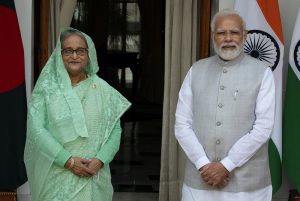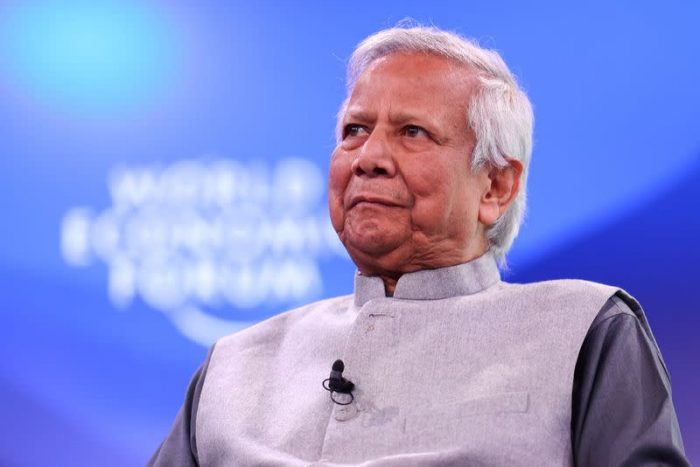Muhammad Yunus, the head of Bangladesh’s interim government, said on Thursday the “high growth” his country reported under ousted Prime Minister Sheikh Hasina was “fake.”
Speaking at the World Economic Forum in Davos, the Nobel laureate faulted the world for not questioning what he said was her corruption. His remarks are no surprise, given Hasina was accused last month of plundering billions – possibly $30 billion during her time in office – by a former IMF official appointed as the country’s new central bank chief.
Yunus, 84, an economist and the 2006 Nobel Peace Prize winner, took charge of the South Asian country’s interim government in August after Hasina was forced to flee to neighbouring India following weeks of violent protests.
ALSO SEE: Trade Wars Would be ‘Catastrophic’ for World Economy: WTO
Hasina has been credited with turning around the economy and the country’s massive garments industry during her 15 years in power, although critics have accused her of serious human rights violations and suppressing free speech and dissent.
Enforced disappearances
Hasina, who ruled Bangladesh for 15 years from 2009 till August last year, is being investigated there on suspicion of crimes against humanity, genocide, murder, corruption and money laundering and Dhaka has asked New Delhi to extradite her.
Human Rights Watch said in a report in 2021 that according to Bangladeshi human rights groups, nearly 600 people have been forcibly “disappeared” by security forces since 2009. It verified 86 enforced disappearances cases in which the fate of the victims remains unknown. Others were freed, shown as arrested or found dead, it said.
A commission investigating the violence before Hasina fled had found information on 1,600 cases of forced disappearance as of October, he said, according to Reuters. And it is now thought that 3,500 may have been forcibly abducted during her 15-year rule.
Hasina and her party deny wrongdoing, while New Delhi has not responded to the extradition request.

‘Nobody questioned’ her
“She was in Davos telling everybody how to run a country. Nobody questioned that,” Yunus told Reuters in an interview on the sidelines of the World Economic Forum’s annual meeting in the Swiss Alpine resort.
“That’s not a good world system at all.”
“The whole world is responsible for making that happen. So that’s a good lesson for the world,” he said. “She said, our growth rate surpasses everybody else. Fake growth rate, completely.”
Yunus did not elaborate on why he thought that growth was fake, but went on to stress the importance of broad-based and inclusive growth, and the need to reduce wealth inequality.
Annual growth in the Muslim-majority country of 170 million people accelerated to nearly 8% in the financial year 2017/18, compared with about 5% when Hasina took over in 2009, before the impact of Covid-19 and the war in Ukraine pulled it down.
In 2023, the World Bank described Bangladesh as one of the world’s fastest-growing economies.
“Since its independence in 1971, Bangladesh has transformed from one of the poorest countries to achieving lower-middle income status in 2015,” it said.
Ties with India strained
The student-led movement in Bangladesh grew out of protests against quotas in government jobs that spiralled in July, provoking a violent crackdown that drew global criticism, although Hasina’s government denied using excessive force.
The student protesters recommended Yunus as the chief adviser in the interim government tasked with holding fresh elections.
Yunus, who has promised to hold elections by the end of 2025 or early 2026, said he was not interested in running.
Known as the “banker to the poor”, Yunus and the Grameen Bank he founded won the Nobel for helping lift millions from poverty with tiny loans of less than $100 offered to the rural poor, too poor to gain attention from traditional banks.
“For me, personally, I’m not very driven by growth rates,” Yunus said. “I’m driven by the quality of life of the people at the very bottom level. So I would rather bring an economy which avoids the whole idea of wealth concentration.”
Ties between Bangladesh and India, who have strong trade and cultural links, have become fraught since Hasina was ousted and she took refuge in New Delhi.
Yunus has demanded that India send Hasina back to Bangladesh so she can face trial for what it says are crimes against protesters and her opponents, and crimes she is accused of committing during her tenure.
Calling India’s rival China a long-term friend of Bangladesh at this difficult time, Yunus said the strained relationship with New Delhi “hurts me a lot personally”.
“Bangladesh-India relationship should be the strongest possible. You know, you cannot draw the map of India without drawing the map of Bangladesh,” he said, referring to how Bangladesh’s land border runs almost entirely alongside India’s.
- Reuters with additional input and editing by Jim Pollard
ALSO SEE:
Bangladesh’s Hasina Accused of $17bn Plunder And Much Worse
Bangladesh Wants Legal Help For Probe Into Adani, Power Deals
Jubilation in Dhaka After Sheikh Hasina Resigns, Flees Bangladesh
Key Bangladeshi Bank Freezes Myanmar Regime Accounts
Bangladesh Agrees $4.5 Billion Bailout Deal With IMF
Bangladesh Protests Break Out After 52% Fuel Price Rise
IMF Receptive to Bangladesh Request for $4.5bn Loan
Deft handling of giant neighbours helps lift Bangladesh, South Asia’s rising star
























